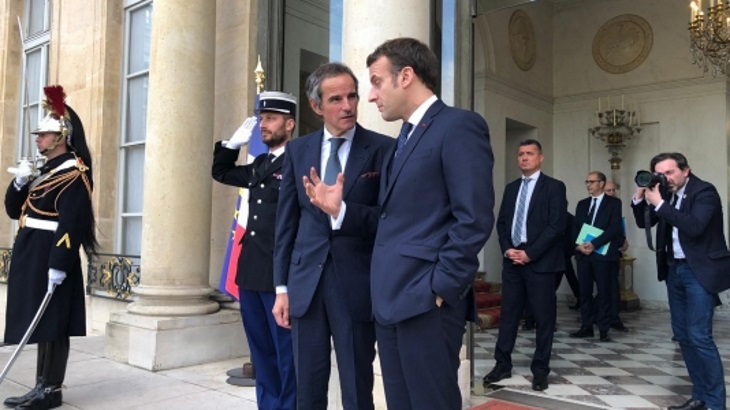Grossi thanks France for leading role in nuclear power
04 March 2020
France's support to the International Atomic Energy Agency's technical cooperation programme "goes a long way" in helping African countries get access to nuclear technology and expertise in the areas of food and agriculture and cancer care, Director General Rafael Mariano Grossi told French Minister of Foreign Affairs Jean-Yves Le Drian yesterday.
 Grossi and Macron in Paris yesterday (Image: IAEA)
Grossi and Macron in Paris yesterday (Image: IAEA)
Grossi was in Paris for his first official trip to France since becoming the head of the IAEA in December last year. He also met with French President Emmanuel Macron and François Jacq, CEO of the French Atomic Energy and Alternative Energies Commission.The IAEA said topics discussed included France's progress in the development of small modular reactors and the role of nuclear power in the fight against climate change and in the reduction of fossil fuel use, as well as the role of nuclear techniques in reaching development objectives, particularly in Africa.
France, whose 58 nuclear reactors produce over 70% of the country's electricity, has a smaller per capita carbon footprint than most other developed countries, Grossi said. This is largely thanks to nuclear energy, he added. "The IAEA is committed to working with any country that shares our vision that nuclear power could be part of the solution against climate change,” he said. “We help them use nuclear power safely, securely and sustainably."
Jacq has acknowledged the role of the IAEA in nuclear safety and security and the benefits to France of IAEA peer review missions, the Vienna-based agency said. These missions, based on IAEA safety standards and security guidance, review the operations of nuclear power plants and provide a report identifying best practices and areas of improvement.
Grossi thanked his French hosts for their support with the IAEA's goals to reach gender parity - both among the beneficiaries of its technical cooperation activities and in its own staffing.
"France has always been a key partner for the IAEA," he said. "We look forward to strong collaboration in the future."
Researched and written by World Nuclear News